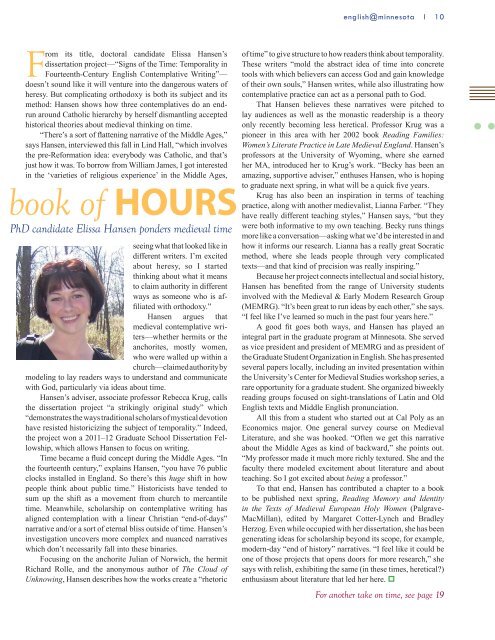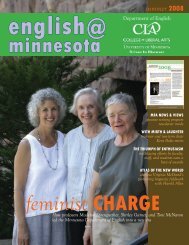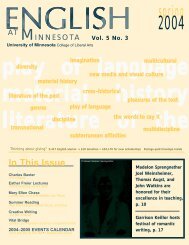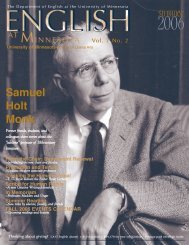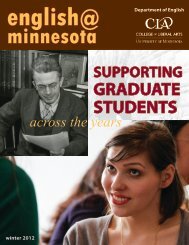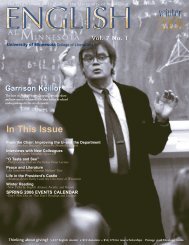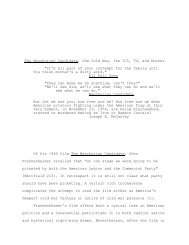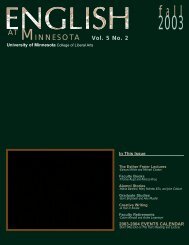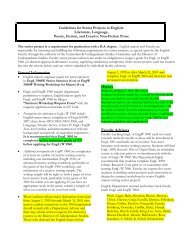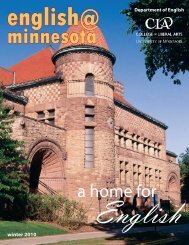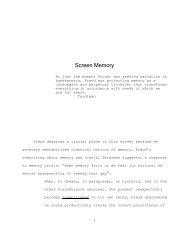Read the 2011 English@Minnesota as a PDF - Department of ...
Read the 2011 English@Minnesota as a PDF - Department of ...
Read the 2011 English@Minnesota as a PDF - Department of ...
Create successful ePaper yourself
Turn your PDF publications into a flip-book with our unique Google optimized e-Paper software.
From its title, doctoral candidate Elissa Hansen’s<br />
dissertation project—“Signs <strong>of</strong> <strong>the</strong> Time: Temporality in<br />
Fourteenth-Century English Contemplative Writing”—<br />
doesn’t sound like it will venture into <strong>the</strong> dangerous waters <strong>of</strong><br />
heresy. But complicating orthodoxy is both its subject and its<br />
method: Hansen shows how three contemplatives do an endrun<br />
around Catholic hierarchy by herself dismantling accepted<br />
historical <strong>the</strong>ories about medieval thinking on time.<br />
“There’s a sort <strong>of</strong> flattening narrative <strong>of</strong> <strong>the</strong> Middle Ages,”<br />
says Hansen, interviewed this fall in Lind Hall, “which involves<br />
<strong>the</strong> pre-Reformation idea: everybody w<strong>as</strong> Catholic, and that’s<br />
just how it w<strong>as</strong>. To borrow from William James, I got interested<br />
in <strong>the</strong> ‘varieties <strong>of</strong> religious experience’ in <strong>the</strong> Middle Ages,<br />
book <strong>of</strong> HOURS<br />
PhD candidate Elissa Hansen ponders medieval time<br />
seeing what that looked like in<br />
different writers. I’m excited<br />
about heresy, so I started<br />
thinking about what it means<br />
to claim authority in different<br />
ways <strong>as</strong> someone who is affiliated<br />
with orthodoxy.”<br />
Hansen argues that<br />
medieval contemplative writers—whe<strong>the</strong>r<br />
hermits or <strong>the</strong><br />
anchorites, mostly women,<br />
who were walled up within a<br />
church—claimed authority by<br />
modeling to lay readers ways to understand and communicate<br />
with God, particularly via ide<strong>as</strong> about time.<br />
Hansen’s adviser, <strong>as</strong>sociate pr<strong>of</strong>essor Rebecca Krug, calls<br />
<strong>the</strong> dissertation project “a strikingly original study” which<br />
“demonstrates <strong>the</strong> ways traditional scholars <strong>of</strong> mystical devotion<br />
have resisted historicizing <strong>the</strong> subject <strong>of</strong> temporality.” Indeed,<br />
<strong>the</strong> project won a <strong>2011</strong>–12 Graduate School Dissertation Fellowship,<br />
which allows Hansen to focus on writing.<br />
Time became a fluid concept during <strong>the</strong> Middle Ages. “In<br />
<strong>the</strong> fourteenth century,” explains Hansen, “you have 76 public<br />
clocks installed in England. So <strong>the</strong>re’s this huge shift in how<br />
people think about public time.” Historicists have tended to<br />
sum up <strong>the</strong> shift <strong>as</strong> a movement from church to mercantile<br />
time. Meanwhile, scholarship on contemplative writing h<strong>as</strong><br />
aligned contemplation with a linear Christian “end-<strong>of</strong>-days”<br />
narrative and/or a sort <strong>of</strong> eternal bliss outside <strong>of</strong> time. Hansen’s<br />
investigation uncovers more complex and nuanced narratives<br />
which don’t necessarily fall into <strong>the</strong>se binaries.<br />
Focusing on <strong>the</strong> anchorite Julian <strong>of</strong> Norwich, <strong>the</strong> hermit<br />
Richard Rolle, and <strong>the</strong> anonymous author <strong>of</strong> The Cloud <strong>of</strong><br />
Unknowing, Hansen describes how <strong>the</strong> works create a “rhetoric<br />
english@minnesota l 10<br />
<strong>of</strong> time” to give structure to how readers think about temporality.<br />
These writers “mold <strong>the</strong> abstract idea <strong>of</strong> time into concrete<br />
tools with which believers can access God and gain knowledge<br />
<strong>of</strong> <strong>the</strong>ir own souls,” Hansen writes, while also illustrating how<br />
contemplative practice can act <strong>as</strong> a personal path to God.<br />
That Hansen believes <strong>the</strong>se narratives were pitched to<br />
lay audiences <strong>as</strong> well <strong>as</strong> <strong>the</strong> mon<strong>as</strong>tic readership is a <strong>the</strong>ory<br />
only recently becoming less heretical. Pr<strong>of</strong>essor Krug w<strong>as</strong> a<br />
pioneer in this area with her 2002 book <strong>Read</strong>ing Families:<br />
Women’s Literate Practice in Late Medieval England. Hansen’s<br />
pr<strong>of</strong>essors at <strong>the</strong> University <strong>of</strong> Wyoming, where she earned<br />
her MA, introduced her to Krug’s work. “Becky h<strong>as</strong> been an<br />
amazing, supportive adviser,” enthuses Hansen, who is hoping<br />
to graduate next spring, in what will be a quick five years.<br />
Krug h<strong>as</strong> also been an inspiration in terms <strong>of</strong> teaching<br />
practice, along with ano<strong>the</strong>r medievalist, Lianna Farber. “They<br />
have really different teaching styles,” Hansen says, “but <strong>the</strong>y<br />
were both informative to my own teaching. Becky runs things<br />
more like a conversation—<strong>as</strong>king what we’d be interested in and<br />
how it informs our research. Lianna h<strong>as</strong> a really great Socratic<br />
method, where she leads people through very complicated<br />
texts—and that kind <strong>of</strong> precision w<strong>as</strong> really inspiring.”<br />
Because her project connects intellectual and social history,<br />
Hansen h<strong>as</strong> benefited from <strong>the</strong> range <strong>of</strong> University students<br />
involved with <strong>the</strong> Medieval & Early Modern Research Group<br />
(MEMRG). “It’s been great to run ide<strong>as</strong> by each o<strong>the</strong>r,” she says.<br />
“I feel like I’ve learned so much in <strong>the</strong> p<strong>as</strong>t four years here.”<br />
A good fit goes both ways, and Hansen h<strong>as</strong> played an<br />
integral part in <strong>the</strong> graduate program at Minnesota. She served<br />
<strong>as</strong> vice president and president <strong>of</strong> MEMRG and <strong>as</strong> president <strong>of</strong><br />
<strong>the</strong> Graduate Student Organization in English. She h<strong>as</strong> presented<br />
several papers locally, including an invited presentation within<br />
<strong>the</strong> University’s Center for Medieval Studies workshop series, a<br />
rare opportunity for a graduate student. She organized biweekly<br />
reading groups focused on sight-translations <strong>of</strong> Latin and Old<br />
English texts and Middle English pronunciation.<br />
All this from a student who started out at Cal Poly <strong>as</strong> an<br />
Economics major. One general survey course on Medieval<br />
Literature, and she w<strong>as</strong> hooked. “Often we get this narrative<br />
about <strong>the</strong> Middle Ages <strong>as</strong> kind <strong>of</strong> backward,” she points out.<br />
“My pr<strong>of</strong>essor made it much more richly textured. She and <strong>the</strong><br />
faculty <strong>the</strong>re modeled excitement about literature and about<br />
teaching. So I got excited about being a pr<strong>of</strong>essor.”<br />
To that end, Hansen h<strong>as</strong> contributed a chapter to a book<br />
to be published next spring, <strong>Read</strong>ing Memory and Identity<br />
in <strong>the</strong> Texts <strong>of</strong> Medieval European Holy Women (Palgrave-<br />
MacMillan), edited by Margaret Cotter-Lynch and Bradley<br />
Herzog. Even while occupied with her dissertation, she h<strong>as</strong> been<br />
generating ide<strong>as</strong> for scholarship beyond its scope, for example,<br />
modern-day “end <strong>of</strong> history” narratives. “I feel like it could be<br />
one <strong>of</strong> those projects that opens doors for more research,” she<br />
says with relish, exhibiting <strong>the</strong> same (in <strong>the</strong>se times, heretical?)<br />
enthusi<strong>as</strong>m about literature that led her here. p<br />
For ano<strong>the</strong>r take on time, see page 19<br />
••


